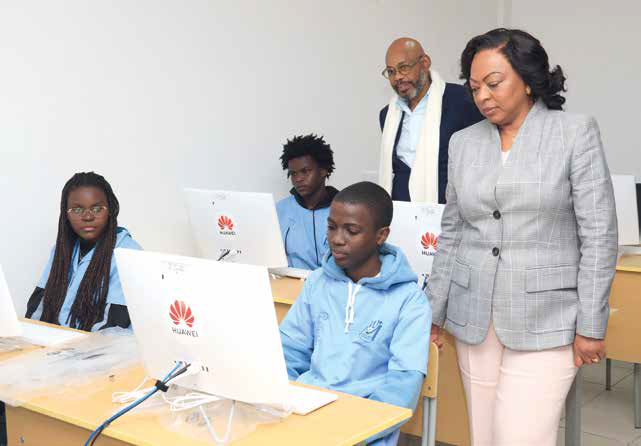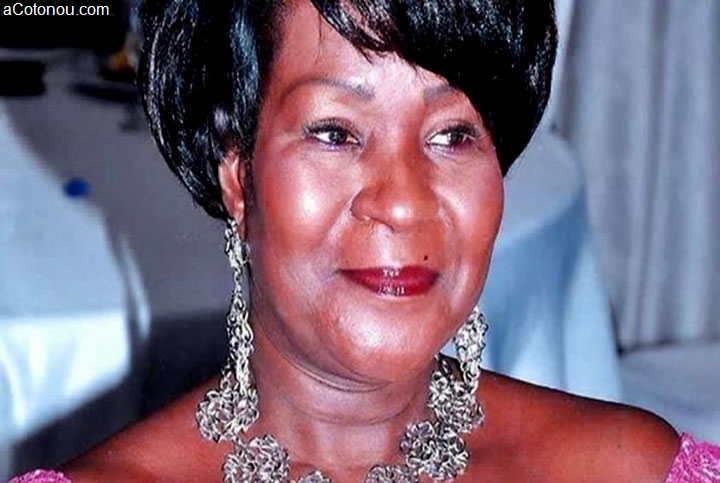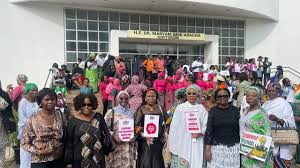EDUCATION AND YOUTH EMPOWERMENT ANGOLA AND ITS PROMOTIONAL VISION FOR HUMAN AND INTELLECTUAL DEVELOPMENT
The Angolan Education Law adopted in 2021 makes primary education free and compulsory for 6 years. The country’s long-term strategy promotes the human and intellectual development of the people.
Angola has an education system that includes primary school, middle school and high school. The service is provided by public and private institutions. Since primary public education is free, the capacity to absorb the demand of this age group is limited. But the government has initiated projects to first ensure an adequate learning environment and to produce young graduates from middle schools, high schools and autonomous universities.
Access to education in 2024 is improving.
At the end of 2024, on the initiative of the government, 80 new schools, representing 729 additional classrooms, opened their doors in Angola to facilitate better access to education and reduce overcrowding in classes.
Initially at 12,547, the increase in the number of schools in Angola is the result of the investment of the Executive in the sector, considered as the starting point for the creation of a developed society, capable of improving the quality and modernizing education, in the face of the multiple challenges of an increasingly competitive and constantly changing world. The ever-increasing number of students forces the government to take appropriate measures to promote education. The 2024/2025 academic year has 237,689 more students than in 2023/2024, bringing the number of enrollments in general education to 9,253,713. According to official data, the availability for initiation and 1st class has been set at 1,600,000 places, for the first entry.
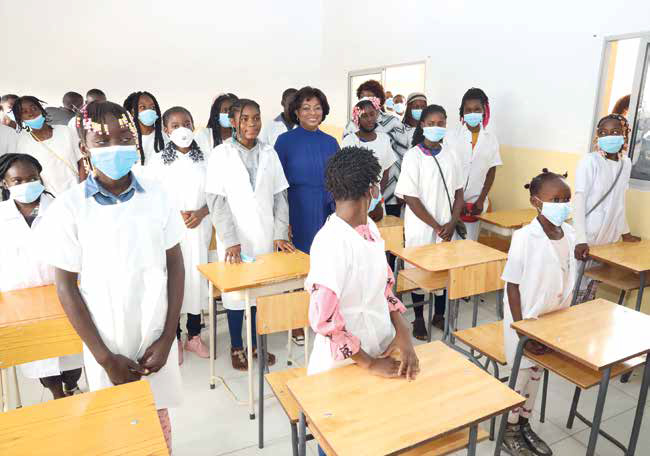
The number of classrooms that has increased has been accompanied by the entry into service of 8,653 new teachers, mostly young, following public competitions organized in the sector. Angola in this 2024/2025 school year has 213,356 teachers compared to 204,703 in the 2023/2024 school year in the various schools.
Still in the context of efforts to improve the Education sector in general, several school equipment, including desks, have been the subject of special attention by the Government.
Furthermore, the Executive supports children from disadvantaged families through the School Canteen Program, which in 2023 benefited just over a million students.
A larger budget allocation will be granted to school meals under the school canteen program so that, gradually, all children in the public education system can benefit from it.
The data show that in the places where this program is implemented, there is higher school attendance, a higher academic success rate and a low school dropout rate.
Also in the area of school social support, the essential contribution of the Project for the Empowerment and Learning of Girls for All (PAT II) stands out, supporting girls in the area of sexual and reproductive health.
Aimed at providing scholarships to reduce costs to families whose children attend the first cycle of secondary education, the project will cover around 900 thousand students by 2025. A salutary decision action of the government in the education system at the end of 2024 was the approval of the National Reading Plan, which aims to encourage reading and raise the literacy level of students in the different subsystems.
More than two million students will benefit from this project by 2027, according to its actors.
Empowering young people.
Empowerment is linked to the process of self-discovery and one’s abilities to contribute to society. It is also linked to acquiring a sense of having a moral vocation. It is by learning to know one’s true nature and innate abilities that a person becomes autonomous.
The Government of Angola, in its quest to ensure a good education for young people and make them autonomous, initiated the Empowerment and Learning for All (PAT) project with the support of the World Bank and some NGOs.
Launched in 2023, the first pilot phase of the project aimed primarily to improve the quality of education through continuous teacher training.
The second phase of this project takes into account three hundred thousand students, aged 10 to 17, from 68 municipalities in Angola according to the announcement made in April 2024 by the Ministry of National Education during the launch of the second part.
Started with the training of school gender focal points in resilience and trauma, the project on the 300 thousand students, girls who represent 70 percent will be educated in sexual and reproductive health, prevention of early pregnancy and school dropout.
They are called upon to analyze issues such as how to recover from trauma related to sexual, physical and psychological abuse, as well as first aid to victims. Lessons on the functioning of the mechanism of suggestions and resolution of complaints will be given to the beneficiaries of the project who are supervised by 25 teachers from the municipalities of Cazengo, Banga and Ambaca of the country.
It is planned in this project that each school enrolled in the program will have a complaint box, where students and the community can file complaints on abuse or sexual harassment according to the authorities of National Education.
Emphasis was placed on menstrual hygiene, adolescent development, sexual and reproductive health, alcohol and other drugs, harassment and gender-based violence during the training of girls so that they can play their full role in society.
Measuring the importance of the project, the Angolan authorities in charge of Education plan to extend the training programmed to various sectors related to academic life.
The authorities cited as an example the first part of the training planned under the project which aims to improve access to information and health services, as well as to reduce the risks of gender-based violence for girls and boys, in some communities and schools.
Among other actions, it is also expected that the sector will focus on the empowerment of young Angolans, especially girls, by increasing the number of students, from 10 to 18 years old, with better access to information and sexual and reproductive health services.
Started in the provinces of Huila, Cunene, Benguela and Luanda, the second cycle of training of PAT-II, at the time of writing this paper covers the other provinces of Angola.
Safeguard Young People (SYP) to strengthen the empowerment of young people.
In partnership with the United Nations Population Fund (UNFPA), the Safeguar Young People Programme (SYP) is strengthening youth empowerment in Angola. The programme (SYP) instills a culture of mutual aid among young Angolans. The Safeguar Young People programme helps young people in Angola address the lack of information and vocational skills through community-led behaviour change interventions, empowering adolescents to lead healthy lives, protect themselves from STIs (including HIV), prevent unwanted pregnancies, unsafe abortions, early marriages, gender-based violence and harmful cultural practices.
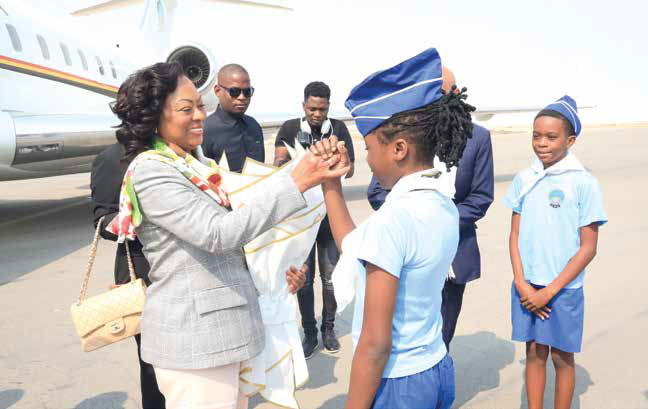
Thus, to achieve the objectives of the program, the actors worked to set up youth support centers in the cities. These are spaces designed to facilitate access to information and training for young people.
The usefulness of this program through these youth support centers is one of the testimonies. Sílvia Francisco, member of the SYP and activist of the Cazenga Youth Support Center, met at the Masculusso Youth Support Center in Luanda, says, “Joining the SYP helped me overcome an internal battle where I thought I had no solution. I live with someone very close to me who has been HIV positive for many years and being an activist helped me help this person, by giving him the right information about everything I have learned about the disease. Today, this person has agreed to follow the entire protocol to be healthy,” she confessed. The main objective of the Safeguard Young People (SYP) program is to support young people and adolescents by providing them with essential knowledge and life skills to improve their decision-making in this challenging context.
Applause and the chant “Shine, we shine” are the warm way in which members of each social mobilization activity led by young activists show respect and affection to other members and visitors.
It is worth mentioning that in Angola, young people are facing difficult realities, moments of support and attention between peers are essential to build essential hope for the future. The unemployment rate is high in Angola, and particularly higher among young people aged 15 to 34 years old at 31% and 15 to 24 years old which exceeds 35%. Gender-based violence remains a major challenge, approximately 33% of women aged 15 to 49 years old are victims of some form of physical or sexual violence.
In 2023, more than 80 youth civil society organization social mobilizers have already been trained in knowledge on sexual and reproductive health, gender-based violence, prevention of STIs including HIV and life skills so that they can empower groups of adolescents and young people after a few months of the program. These activists are expected to lead community benches in five (5) provinces. Similarly, 10,265 young people were impacted during the year by these community engagement and peer behavior change activities.
The Angolan population is very young, with 47.1% of Angolans under 15 years old and 66.4% under 25 years old according to the National Institute of Surveys report published in 2015.
The program (SYP) that gives young people essential social skills for mutual assistance and for development and empowerment is well appreciated in Angola.
“As an activist, it is a constant struggle to transmit information about sexuality, because there are still parents who think that talking about sexuality with adolescents and young people leads them to have sexual relations. But with our dynamics and the methods we have learned through the SYP, we always manage to transmit the message of protection and delay the dating of adolescents,” explains Silvia Francisco, member of the SYP and activist of the Youth Support Center of Cazenga.
Community-led social mobilization through the (SYP) program is important to reach out-of-school youth, as gender imbalances in the education sector persist.
In Angola, a study reported that 17% of youth have never attended school, with a gender distribution of 11% for men and 23% for women. Angola has a generalized HIV epidemic with a prevalence in the adult population aged 15-49 years of 2%, with 2.6% among women and 1.2% among men.
The SYP program was designed to address the sexual and reproductive health and rights needs of adolescents and youth.
The SYP aims to empower adolescents and youth to lead healthy lives, protect themselves from STIs (including HIV), prevent unwanted pregnancies, unsafe abortions, early marriages, gender-based violence and harmful cultural practices.
It is worth noting that 126 teachers from schools in Luanda were trained in sexuality education, menstrual health and Sexual Reproductive Health (SRH) for school-based training for girls and boys reaching 6,220 students in 40 schools with inclusive and quality SRH courses under this program in Angola according to the actors.
The SYP aims to simultaneously promote inclusion, gender equality norms and protective behaviors, thus contributing to universal access to sexual and reproductive health and the realization of the reproductive rights of adolescents and young people in five provinces of Angola. The program aims to accelerate efforts to reduce teenage pregnancies and unwanted pregnancies among young people and women, with the corresponding benefits of investment in education, promoting their empowerment to reach their full potential.
The activities are focused on the group of adolescents and young people aged 10 to 24 years. Secondary beneficiaries are adult women and men, health professionals, teachers, community and religious leaders.
In Angola, the SYP program is supported by the Ministry of Youth and Sports and the Embassy of the Netherlands and aims to reach 60,000 adolescents and youth by 2026.
The Angolan government has accepted and supported this program given its vision to empower youth to initiate the rational development of the country.
Ferdinand GADE, on special assignment, in Angola

